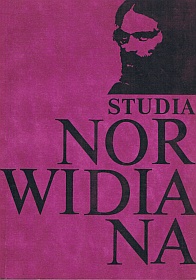Preface to the first German edition of Cyprian Norwid’s Vade-mecum. (Translated from the German by Michał Kaczmarkowski)
Abstract
The article examines Norwid’s position in contemporary European poetry against the backround of the fates of 19th century French poetry. Norwid is compared first of all with Baudelaire and his Les fleurs du mal, and many differences are noted in the way that these two “classics of the modern era” approached similar problems. Growing out of common (biographical) roots and sharing similar experiences of the eclipse of political romanticism (the years 1848 and 1863), the two poets made an analogous retreat from romanticism to classicistic forms and ultimately reached different destinations. Both take up the problem of “poetry at the point of crisis” , but Norwid’s Vade-mecum is not a continuation of Les fleurs du mal because ethical questions and moral duties to his own time are of more concern to him than questions of poetic form. Norwid’s poetry embodies a conscious experience of the present and a striving to transform it. Norwid’s paradoxical and harrowing lack of success in his own time invalidates such labels sometimes given to him as “Parnassian” , “symbolist” or “hermetic poet” . Norwid is a classic of a suppressed modernity that associates its individual destiny with the social as well as the subjective element.
Copyright (c) 1985-1986 Studia Norwidiana

This work is licensed under a Creative Commons Attribution-NonCommercial-NoDerivatives 4.0 International License.





